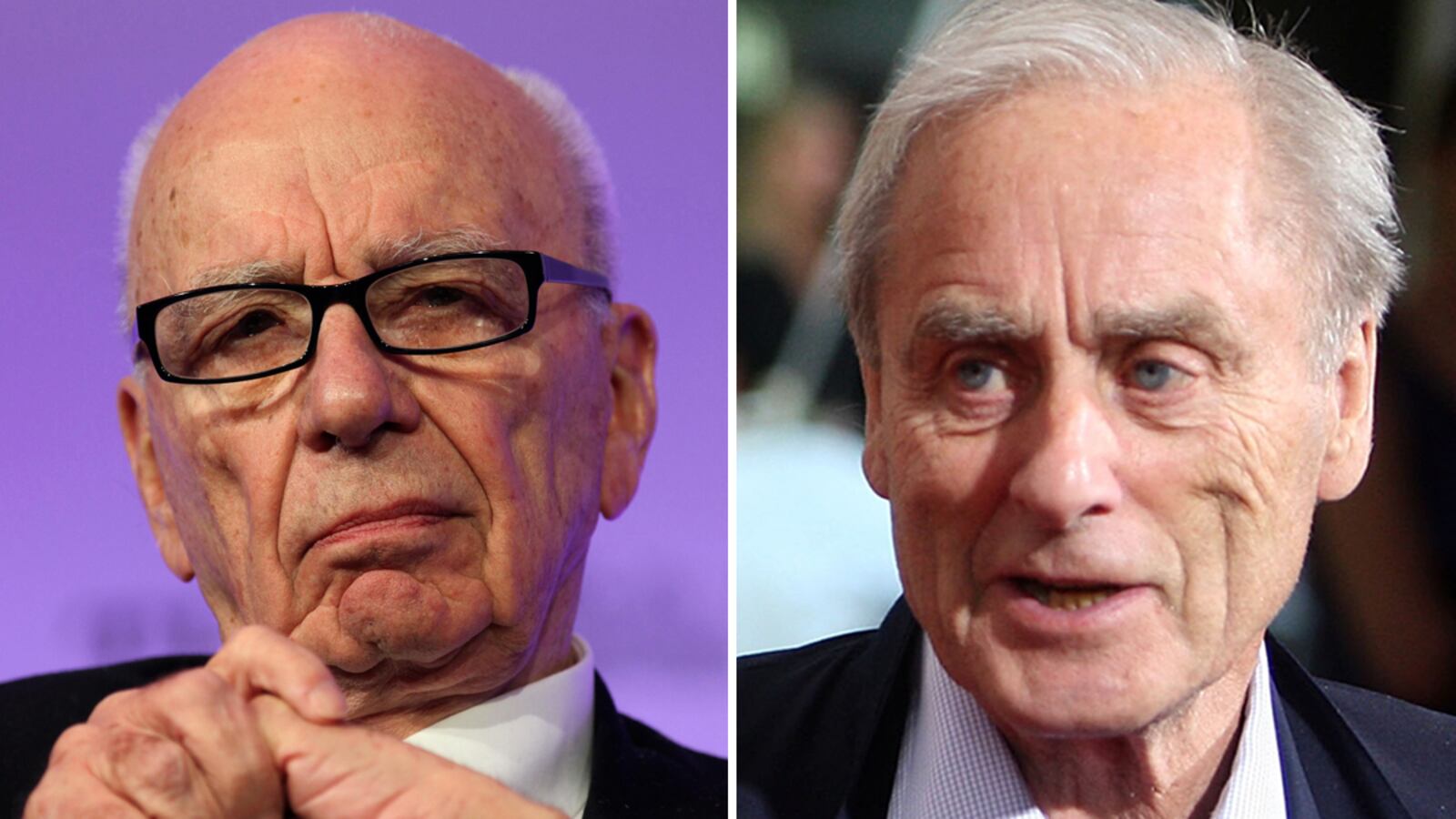It was comic and sad to see Rupert Murdoch testify at the Leveson Inquiry this morning dealing with all the charges against him. It was comic for me because he had to find a way of denying that he ever broke his promise to maintain the independence of The Times under my editorship. Political independence was only one of the promises he made and broke. It was sad that, having lost his memory, he compensated by spectacular displays of imagination. On the stand he invented a scene in which I came on my knees, begging him to tell me what to think, and not to tell anybody that I’d asked him.

To the detailed evidence in my book Good Times, Bad Times—never challenged or repudiated over 30 years—he could only affect memory loss, and claimed never to have read the book, which describes a year of meetings.
There is a pattern to the Murdoch sagas. He responds to serious criticism by a biting wisecrack or diversionary personal attack. What is denied most sharply invariably turns out to be irrefutably true. As with the hacking saga, so with my charges. It’s fair to say Good Times, Bad Times was well received, but several commentators suggested I had exaggerated the influence of Margaret Thatcher, and that Murdoch had honored the editorial independence he promised the editors of The Times and The Sunday Times. Charles Moore said the story should have waited until I had died; it was ungentlemanly, he thought, to write so soon of events of which I had knowledge. I am sorry I disappointed him by staying alive.
It must disappoint all the apologists that on March 16, 2012, the Churchill Archives Centre (CAC) in Cambridge released two discomfiting documents from the Margaret Thatcher Foundation. They give the lie to the official history of The Times from 1981 to 2002. The historian engaged by The Times, Graham Stewart, wrote that Murdoch and Thatcher “had no communication whatsoever during the period in which The Times bid and referral was up for discussion.” [i] On the contrary, the documents reveal that on Jan. 4, 1981, the prime minister and Murdoch had an extraordinary secret lunch at Chequers, the prime minister’s country residence.
The record of the “salient points” of the meeting by No. 10’s press officer, (now Sir) Bernard Ingham, testifies that in accordance with Thatcher’s wishes he would not let his report go outside No. 10, which is to say ministers would not be briefed on the meeting. It must be galling for Stewart that the source he relied on for the falsehood in his history was the man who engaged him to write it. The meeting that Stewart writes never took place was highly improper. Moreover, Ingham’s “note for the record” reeks of cover-up in triplicate. It bears some parsing.
First, the pretense is that Murdoch was afforded a private meeting with the prime minister so she could be briefed on the takeover battle. That’s absurd enough, given the coverage in the press and the responsibilities of the Department of Trade. The larger absurdity is that the prime minister’s redundant “briefing” is being done by only one bidder, and by one who has an urgent interest in rubbishing his competitors. Interestingly, Murdoch’s list of rivals makes no mention of someone Stewart refers to as making a “serious offer” [ii]: Vere Harmsworth, the third Lord Rothermere, the most formidable of the newspaper owners whose great uncle Lord Northcliffe owned The Times between 1908 and 1922, a newspaper genius whose mind failed him at the end. Murdoch also chose not to inform the prime minister of the bid by the Sunday Times’s management buyout team, which submitted its offer to the Thomson Organization on Dec. 31, 1981. The monetary amount of £12 million sterling was the same. He deliberately conflates the bid by the profitable Sunday Times editors and managers with the less credible bid by journalists of the loss-making Times.
Second, Ingham’s note is obviously drafted to deal with the eventuality that the clandestine meeting would one day come to light. On that account, it is ludicrous. We are asked to believe that there was no mention at the lunch of the clear legal requirement for Murdoch’s bid to be referred to the Monopolies and Mergers Commission. The prime minister had a duty to remind him of the laws she had sworn to honor and enforce. Did she not emit at least a polite cough? If she did not, she was uncharacteristically negligent. And if she did murmur something, why did Ingham choose not to record it? Sir Bernard is, alas, unable to help us with anything. He has no memory of the meeting.
As the narrative in this book makes clear, it is significant that in the crucial cabinet meeting three weeks later it was Thatcher who claimed that the fine print of the act would exempt Murdoch from its provisions on the grounds that both papers were unprofitable. I relate in the chapter entitled “Biffen’s Missing Millions” that this statement was not true of The Sunday Times. Indeed, one of the unremarked ironies in Ingham’s account of the meeting is Murdoch’s enthusiasm for the success of the paper: “… even at the depths of a recession, this newspaper was turning down advertising ...” And “the market clearly permitted” an increase in advertising rates.
Third, there’s the exchange at the end of the lunch. The statement that Thatcher concluded the visit by wishing Murdoch well would have been polite, if, again, improper in the circumstances. But that is not how Ingham records it. He writes (my italics): “The Prime Minister … did no more than wish him well in his bid ...” Why “did no more”?
The second document released is a handwritten letter from Murdoch to Thatcher from his Eaton Place home. “My dear Prime Minister,” he writes, saying he greatly enjoyed seeing her again. Ostensibly the letter thanks her for letting him interrupt her weekend at Chequers. It is dated Jan. 15. This is very odd.
Murdoch is traditionally punctilious on such matters. The idea that he delayed 11 days to thank his most important connection for the newspaper acquisition of his career does not scan. The smell of documents being cooked is discernible. Moreover, Murdoch was at pains to make a point of emphasizing his dilatoriness, first saying his thanks are “belated,” and then hammering it home by adding that it was “ten days” since they met. At the hearing this morning, he was anxious again to stress that he was late in writing to her. Why this anxiety? Curiously, his letter’s date line, Jan. 15 , is a correction for another date. Is one meant to infer that he began to write on his return from Chequers, and was interrupted; or is it a slip? Trifles, perhaps, but things are often not what they seem in events suffused with so much subterfuge.
[i] Graham Stewart, "The History of The Times: The Murdoch Years," Harper Collins, 2003, p. 28. He is not to be blamed for this error. It should be noted, though, that Mussolini’s fake diaries were not bought by the Thomson Organization in 1968 on my watch, but before I became editor of The Sunday Times in 1967.
[ii] Stewart, op. cit. p. 20. Rothermere, writes Stewart, was “a victim of his own honesty” in emphasizing he was primarily interested in The Sunday Times.
Adapted from "Good Times, Bad Times," by Harold Evans. New edition, published by Open Road Integrated Media LLC.






